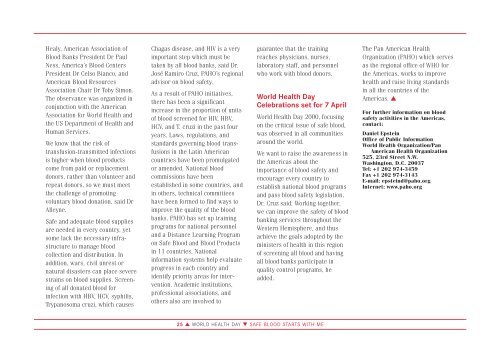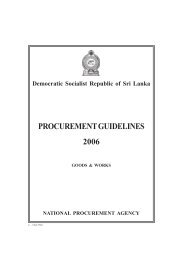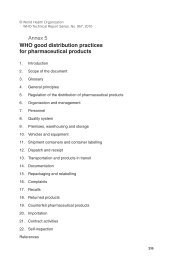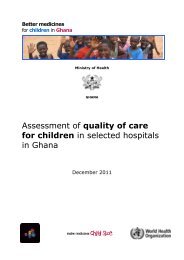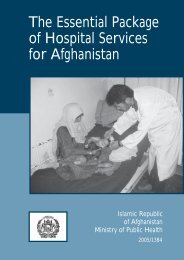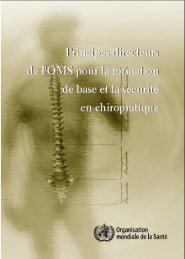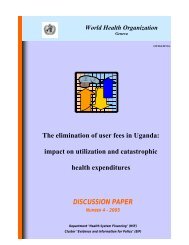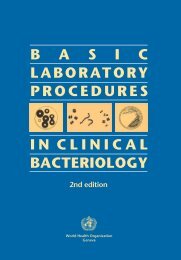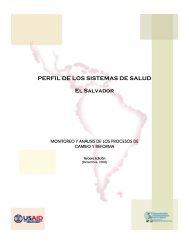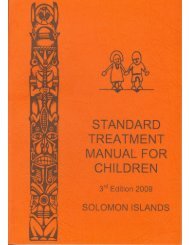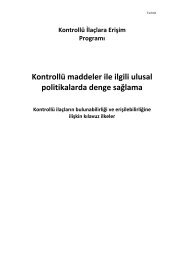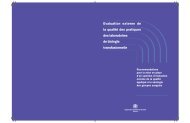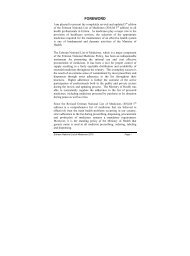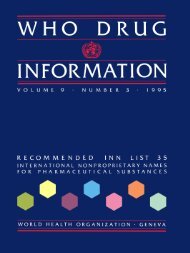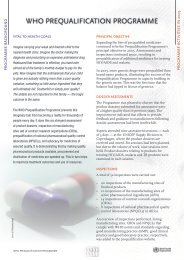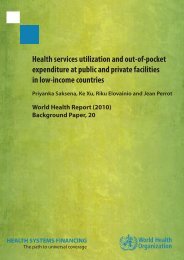BLOOD SAVES LIVES IN THE PAN AMERICAN HEALTH ORGANIZATION/WHO REGIONAL OFFICE FOR THEAmericasNew initiative launchedon <strong>World</strong> <strong>Health</strong> Day 2000rallies the Americas onblood safetyUnsafe blood and blood shortagesthreaten the health of people <strong>who</strong>need blood transfusions in somecountries of the Americas. A newinitiative has been launched toencourage more blood donationsand raise awareness of theimportance of having a safe andadequate blood supply at all times,Dr George A.O. Alleynesaid Dr George A.O. Alleyne,Director of the Pan American<strong>Health</strong> <strong>Organization</strong>.This initiative, launched on 7April, <strong>World</strong> <strong>Health</strong> Day 2000,focused on the critical issue ofsafe blood throughout theAmericas and the world, <strong>with</strong> thetheme: <strong>Safe</strong> <strong>Blood</strong> <strong>Starts</strong> With <strong>Me</strong>,<strong>Safe</strong> <strong>Blood</strong> Saves Lives.It is critical for all countries tojoin the effort to raise awarenessof the importance of safe,adequate blood supplies and forpeople everywhere to donate bloodat least twice a year. <strong>Safe</strong> blood,<strong>with</strong> no infectious agents, can onlycome through adequate screeningand testing of blood. All citizens ofthe Americas must be assured ofreceiving safe blood when theyneed it, Dr Alleyne said. We wantpeople to understand and acceptblood donation as a desirable,altruistic act, and health workersto discourage replacementdonation and retain and educatevolunteer donors, he added.<strong>Blood</strong> for transfusion is obtainedfrom voluntary, unpaid donors inonly a small proportion ofcountries and territories in theAmericas. At the national level,only Aruba, Curaçao, Cuba,Canada, and the United States,report 100% voluntary donations.Only 16 countries—eight in theEnglish-speaking Caribbean, six inLatin America, and Canada andthe United States—reportscreening 100% of donated unitsfor the human immunodeficiencyvirus (HIV), hepatitis B (HBV), andhepatitis C (HCV).Available data for the Americas,excluding Canada and the UnitedStates, indicate that 99% of allunits of blood collected arescreened for HIV and HBV and60% for HCV. This means that,annually, around 50,000 units aretransfused that have not beenscreened for HIV and HBV, andaround 1,500,000 units aretransfused that have not beenscreened for HCV, according toPAHO figures from the countries.In a <strong>World</strong> <strong>Health</strong> Day 2000ceremony at PAHO, Dr Alleyneaccepted a donation ofUS$100,000 from the PanAmerican <strong>Health</strong> and EducationFoundation (PAHEF) for PAHO’snew regional blood safetyinitiative. It was given by Sandrade Castro Buffington, VicePresident of Corporate Communicationsfor BuenaSalud.com, anda member of PAHEF’s Board ofTrustees.The <strong>World</strong> <strong>Health</strong> Day observationin Washington featured USSurgeon General Dr DavidSatcher, American Red CrossPresident and CEO Dr Bernadine24 ▲ WORLD HEALTH DAY ▼ SAFE BLOOD STARTS WITH ME
Healy, American Association of<strong>Blood</strong> Banks President Dr PaulNess, America’s <strong>Blood</strong> CentersPresident Dr Celso Bianco, andAmerican <strong>Blood</strong> ResourcesAssociation Chair Dr Toby Simon.The observance was organized inconjunction <strong>with</strong> the AmericanAssociation for <strong>World</strong> <strong>Health</strong> andthe US Department of <strong>Health</strong> andHuman Services.We know that the risk oftransfusion-transmitted infectionsis higher when blood productscome from paid or replacementdonors, rather than volunteer andrepeat donors, so we must meetthe challenge of promotingvoluntary blood donation, said DrAlleyne.<strong>Safe</strong> and adequate blood suppliesare needed in every country, yetsome lack the necessary infrastructureto manage bloodcollection and distribution. Inaddition, wars, civil unrest ornatural disasters can place severestrains on blood supplies. Screeningof all donated blood forinfection <strong>with</strong> HBV, HCV, syphilis,Trypanosoma cruzi, which causesChagas disease, and HIV is a veryimportant step which must betaken by all blood banks, said Dr.José Ramiro Cruz, PAHO’s regionaladvisor on blood safety.As a result of PAHO initiatives,there has been a significantincrease in the proportion of unitsof blood screened for HIV, HBV,HCV, and T. cruzi in the past fouryears. Laws, regulations, andstandards governing blood transfusionsin the Latin Americancountries have been promulgatedor amended. National bloodcommissions have beenestablished in some countries, andin others, technical committeeshave been formed to find ways toimprove the quality of the bloodbanks. PAHO has set up trainingprograms for national personneland a Distance Learning Programon <strong>Safe</strong> <strong>Blood</strong> and <strong>Blood</strong> Productsin 11 countries. Nationalinformation systems help evaluateprogress in each country andidentify priority areas for <strong>int</strong>ervention.Academic institutions,professional associations, andothers also are involved toguarantee that the trainingreaches physicians, nurses,laboratory staff, and personnel<strong>who</strong> work <strong>with</strong> blood donors.<strong>World</strong> <strong>Health</strong> DayCelebrations set for 7 April<strong>World</strong> <strong>Health</strong> Day 2000, focusingon the critical issue of safe blood,was observed in all communitiesaround the world.We want to raise the awareness <strong>int</strong>he Americas about theimportance of blood safety andencourage every country toestablish national blood programsand pass blood safety legislation,Dr. Cruz said. Working together,we can improve the safety of bloodbanking services throughout theWestern Hemisphere, and thusachieve the goals adopted by theministers of health in this regionof screening all blood and havingall blood banks participate inquality control programs, headded.The Pan American <strong>Health</strong><strong>Organization</strong> (PAHO) which servesas the regional office of WHO forthe Americas, works to improvehealth and raise living standardsin all the countries of theAmericas. ▲For further information on bloodsafety activities in the Americas,contact:Daniel EpsteinOffice of Public Information<strong>World</strong> <strong>Health</strong> <strong>Organization</strong>/PanAmerican <strong>Health</strong> <strong>Organization</strong>525, 23rd Street N.W.Washington, D.C. 20037Tel: +1 202 974-3459Fax +1 202 974-3143E-mail: epsteind@paho.orgInternet: www.paho.org25 ▲ WORLD HEALTH DAY ▼ SAFE BLOOD STARTS WITH ME
- Page 3 and 4: WHO/BCT/01.03 • Original: English
- Page 5 and 6: SAFE BLOOD STARTS WITH ME - BLOOD S
- Page 8 and 9: It is our hope that the ideas and e
- Page 10 and 11: continual technical assistance toen
- Page 13 and 14: leaflets, flags, pins, stickers and
- Page 15 and 16: WHO House in New Delhi. In thisregi
- Page 18 and 19: SAFE BLOOD STARTS WITH ME - BLOOD S
- Page 20 and 21: Another example of industrialpartne
- Page 22 and 23: the University of Bujumburatwirled,
- Page 24 and 25: Faithful Blood Donor Prizes1st 150k
- Page 26 and 27: The Johannesburg cycling team.Polic
- Page 28 and 29: SAFE BLOOD STARTS WITH ME - BLOOD S
- Page 31: Masiyarwa Secondary School bannerpr
- Page 35 and 36: What is blood used for?Red cells ar
- Page 37 and 38: Youth solidarity with the blood don
- Page 39 and 40: MaterialsEvery form imaginable was
- Page 41 and 42: targeted at health personnel of the
- Page 43 and 44: Metropolitan North HealthService: t
- Page 45 and 46: SAFE BLOOD STARTS WITH ME - BLOOD S
- Page 47 and 48: Campaign at local universityBlood d
- Page 49 and 50: — Love of our fellow humanbeings;
- Page 51 and 52: Laboratory in Coahuilatragedy, or p
- Page 53 and 54: SAFE BLOOD STARTS WITH ME - BLOOD S
- Page 55 and 56: During the event, diplomas andT-shi
- Page 57 and 58: own video film on blood safety,usin
- Page 59 and 60: pressure. The Bahrain DiabetesSocie
- Page 61 and 62: SAFE BLOOD STARTS WITH ME - BLOOD S
- Page 63 and 64: Quality management— quality depar
- Page 65 and 66: donation campaigns. The specificobj
- Page 67 and 68: SAFE BLOOD STARTS WITH ME - BLOOD S
- Page 69 and 70: emunerated donors and toincrease th
- Page 71 and 72: BLOOD SAVES LIVES IN WHO’S REGION
- Page 73 and 74: SAFE BLOOD STARTS WITH ME - BLOOD S
- Page 75 and 76: World Health Day 2000In promoting b
- Page 77 and 78: and the mobile-team sessionrecorded
- Page 79 and 80: antigen. Six post-transfusion HIVin
- Page 81 and 82: collection on 5 April on thepremise
- Page 83 and 84:
clinical use of blood products.Spec
- Page 85 and 86:
ConclusionThe national authorities
- Page 87 and 88:
Given the relatively short storagel
- Page 89 and 90:
… a staggering two-thirdsof the S
- Page 91 and 92:
Press conferenceA press conference
- Page 93 and 94:
with messages on the theme of theda
- Page 95 and 96:
SAFE BLOOD STARTS WITH ME - BLOOD S
- Page 97 and 98:
SAFE BLOOD STARTS WITH ME - BLOOD S
- Page 99 and 100:
ungalow. Six blood bankscollected 9
- Page 101 and 102:
SAFE BLOOD STARTS WITH ME - BLOOD S
- Page 103 and 104:
SAFE BLOOD STARTS WITH ME - BLOOD S
- Page 105 and 106:
express gratitude to theorganizers
- Page 107 and 108:
“we owe it to ourselves tohave he
- Page 109 and 110:
(which in reality includes aproport
- Page 111 and 112:
throughout the campaign, eitheras g
- Page 113 and 114:
SAFE BLOOD STARTS WITH ME - BLOOD S
- Page 115 and 116:
SAFE BLOOD STARTS WITH ME - BLOOD S
- Page 117 and 118:
An altruistic IssueIt is not only i
- Page 119 and 120:
Mongolian language anddistributed,
- Page 121 and 122:
SAFE BLOOD STARTS WITH ME - BLOOD S
- Page 123 and 124:
of effective blood screeningmeasure
- Page 125 and 126:
ANNEX 1Pledge 25—A blood donor cl
- Page 127 and 128:
— Albumin, which is an importantp
- Page 129 and 130:
Are there any risksin giving blood?
- Page 131 and 132:
Voluntary non-remunerated blooddono
- Page 133 and 134:
ANNEX 4. THE APPROPRIATE CLINICAL U
- Page 135 and 136:
Other than in the most exceptionall
- Page 137 and 138:
should define the measures that wil
- Page 140:
Department of Blood Safety and Clin


